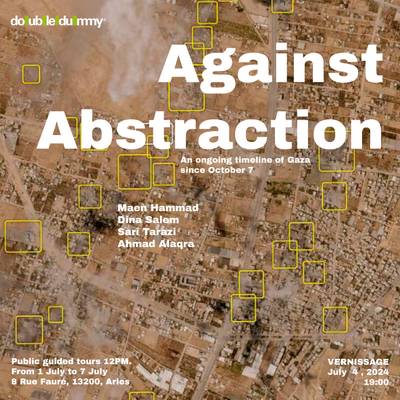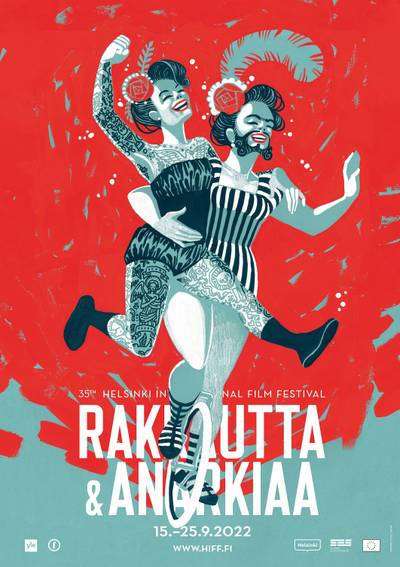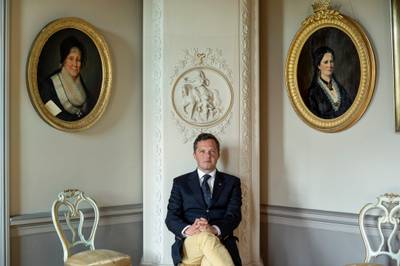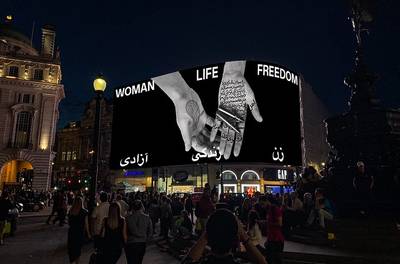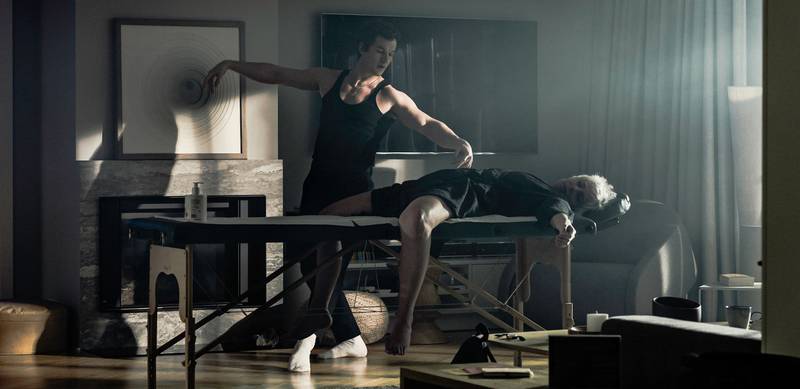

Film still from Never Gonna Snow Again
Maria Koskivirta (b. 1999) is a Helsinki based audiovisual artist, with a key interest in cinema. Studying the medium of film, her intent is to bring forward all the subtle moments in the film that are left unsaid. Regardless of the piece, there’s always more that can be explored through the subjective perception of someone else’s eyes.
Never Gonna Snow Again | Directed by Malgorzata Szumowska, Michal Englert | Duration: 1h 56min | Language: Polish, Russian
Never Gonna Snow Again is a comedy-drama film that focuses on the arrival of a charming healer called Zhenia (Alec Utgoff), who enters the lives of the privileged few living in a gated community on the outskirts of Poland. Malgorzata Szumowska, who co-directed it with Michał Englert, made the film in 2020, creating a piece that scrutinizes the current state of the world through a humoristic lense. By presenting a melancholic “healing” journey that focuses on a few different families living in the community, this film really takes the viewer into a subliminal state of mind.
Even though we are perceiving the movie through Zhenia’s eyes, there’s an underlying sense that the families who are troubled with their unique, but yet ordinary lives are the real focus of the movie. The film revolves around a burnt-out mother, a man with cancer, a widow as well as an alcoholic dog owner. The past of Zhenia, being from Prypjat, Ukraine, also makes the character really stand out from the portrayed community. He speaks Russian to his clients that all adore him, probably reminding them about something hidden in their past.
The underlying themes of loneliness, death, jealousy, and desperation are inevitably present in the atmosphere throughout the film. Like Szumowska’s other pieces also, this film has a similar dreamlike signature flow and the haunting backstory adds up to the airy nature of the film. Zhenia is otherwise a very mysterious character in the movie, but his friendship with the doorman provides more depth to his personality. Then we see the first interaction that is purely spontaneous and genuine, almost like a reminder of what the actual moments with real people look like.
The recurring messages that take place in this picturesque suburbia really bring out the class issue. Not trying to belittle the problems of the people actually living in the community, but more to show how present economic segregation is today. It shines a light on the growing wealth inequality between most people today. The contrast between the shots from the symmetrical houses with the industrial city in the background is one of the messages that Zhenia comes from a totally opposite basis of life.
These richer, gated areas are deemed to be safer because of the seclusion, but at the price of losing a touch with reality. In the film, we see a kind of cultish neighborhood with real people with real problems. However, at the same time, people are interactive creatures that are dependent on their surroundings, which is why these communities are doomed to be morally corrupt since people are subconsciously mirroring other people’s hardships from close proximity.
The way these themes are presented really shows the director’s ability to play with light and dark. The symbolistic spectrum goes all the way to scenes playing homage to Tarkovsky to a light-hearted nudge towards Hugh Grant’s notorious dance scene from Love Actually. Szumowska’s ability to explore more serious themes in a light-hearted satirical way really makes them easy to watch, even for younger people.
The atmospheric cinematography succeeds in building this ethereal image of the world; directly polarising the shots between the industrial scenery and nature. The viewer is faced with the biggest topic that foreshadows the thematics - climate change. In the end, the core issue is implicated to be the future of the planet, in the story as in real life. This main theme could have been presented more clearly especially in the dialogue since most of the references were visual.
Still Never Gonna Snow Again really raises the concerns around environmentalism. It’s trying to tell this message of a failing world through some humour and fantasy. The protagonist’s integration into this Polish community is like a wake-up call to the inhabitants, who many seem to be oblivious to the growing issue of climate change. I think it reflects directly the current view that many hold today, leaving you to contemplate your own choices afterwards. Am I just blinded by the bubble I am living in, completely unaware? Just living out my own learned pattern, in need of someone to come and wake me up to the real world.
